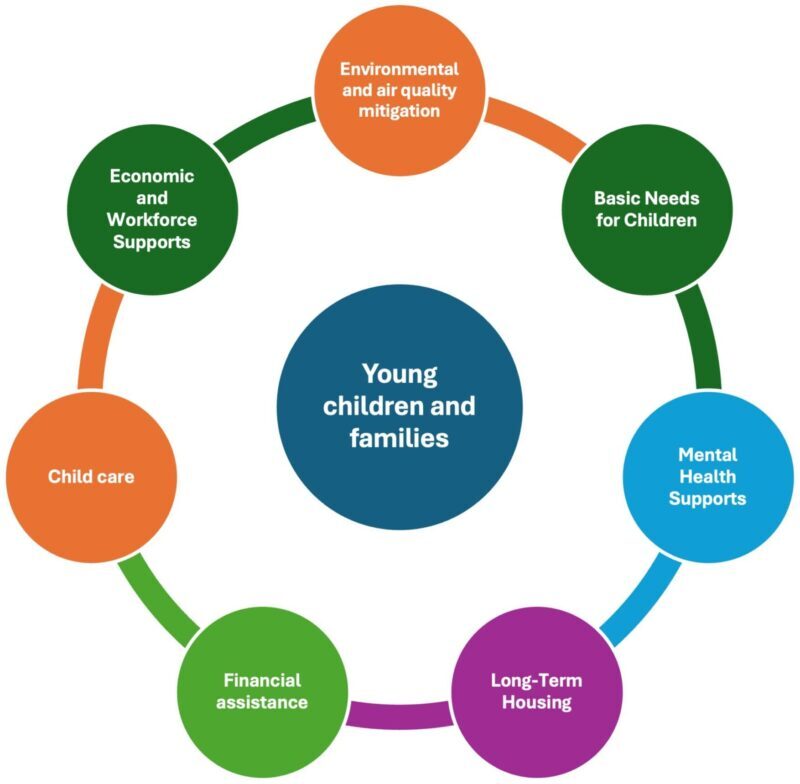By, Ruel Nolledo | Freelance Writer
February 26, 2025
It’s a crisp, bright February morning in Robinson Park, where Pasadena’s annual Black History Festival is underway. Despite the fires that raged just a mile north of the park 15 days earlier, people are gathered here now to support one another and their community, which has faced so much loss in the past month alone.
“It’s still an open wound,” says Ashant’a Stoner, the community and outreach co-chair of the San Gabriel Valley Community Action Team (SGV CAT), a regionally based partnership created and supported by L.A. County’s African American Infant and Maternal Mortality (AAIMM) Prevention Initiative. “This is a very close-knit community, so it’s not just about the damage and loss of homes. People lost loved ones and friends.”
Ashant’a and the rest of the SGV CAT have been hard at work these last few weeks, helping families affected by the fires. In addition to checking in with the moms to make sure they were safe, SGV CAT members made sure they were directed to the proper resources. The SGV CAT also drew on their extensive system of contacts to secure basic supplies, such as diapers and clothing, which they packed onto a pallet and shipped to relief partners in the Foothill area.
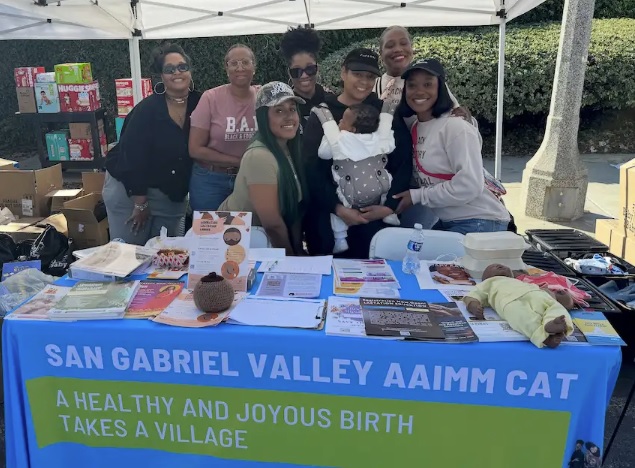
The team is out in full force at the festival today, with a resource booth at the north end of the festival grounds. While several team members transport boxes of supplies from their truck to the booth, Ashant’a and Niki, another CAT member, are chatting with several parents who have converged at the booth, their toddlers in tow. Ashant’a runs through the list of resources they have on hand: diapers, baby clothing, shoes, toys and more. They also offer information on lactation support, emergency child care, mental health services for parents and children, and more.
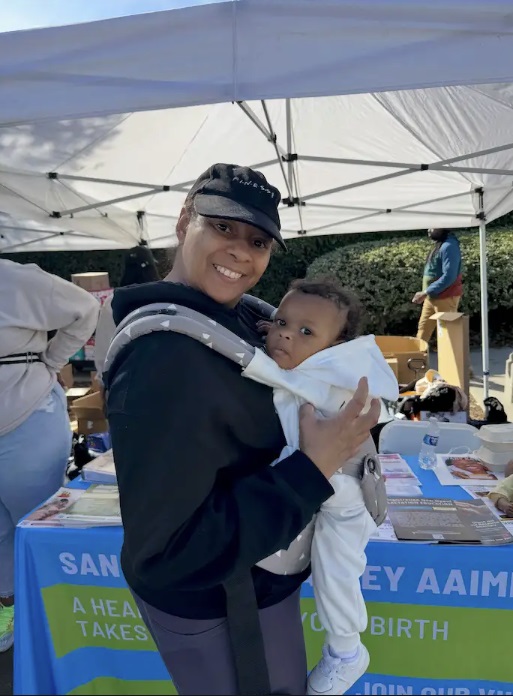 “This community has been through a lot,” shares Niki as she cradles her infant daughter Jyoti-Niia. “There’s so much more that we need to do.”
“This community has been through a lot,” shares Niki as she cradles her infant daughter Jyoti-Niia. “There’s so much more that we need to do.”
The SGV CAT is just one of the groups and organizations stepping forward to help families with young children who have been impacted by the fires. Research shows that children are incredibly vulnerable to the severe disruptions that follow in the aftermath of a natural disaster. When wildfires and floods ravage a child’s home and community, it often results in economic hardship, loss of child care, educational setbacks, increased mental health issues, and more.
First 5 LA has been working with its partners to address the immediate needs of these families and communities while also laying the groundwork for long-term support. When the fires first broke out, First 5 LA staff began visiting FEMA recovery sites to get a better sense of what young children were experiencing. During this time, the agency also reached out to its partners and grantees throughout the county to learn how the fires had affected their work and the young children and families they served.
The responses received — representing 37 child care coalitions, health plans and hospitals, regional centers and more — raised several urgent concerns, including the need for environmental remediation, mental health services, support for providers who lost their jobs, and programmatic flexibility from funders for organizations directly affected by the fires. The assessment also highlighted the various kinds of support needed by families with children, including basic needs, mental health support, long-term shelter and child care.
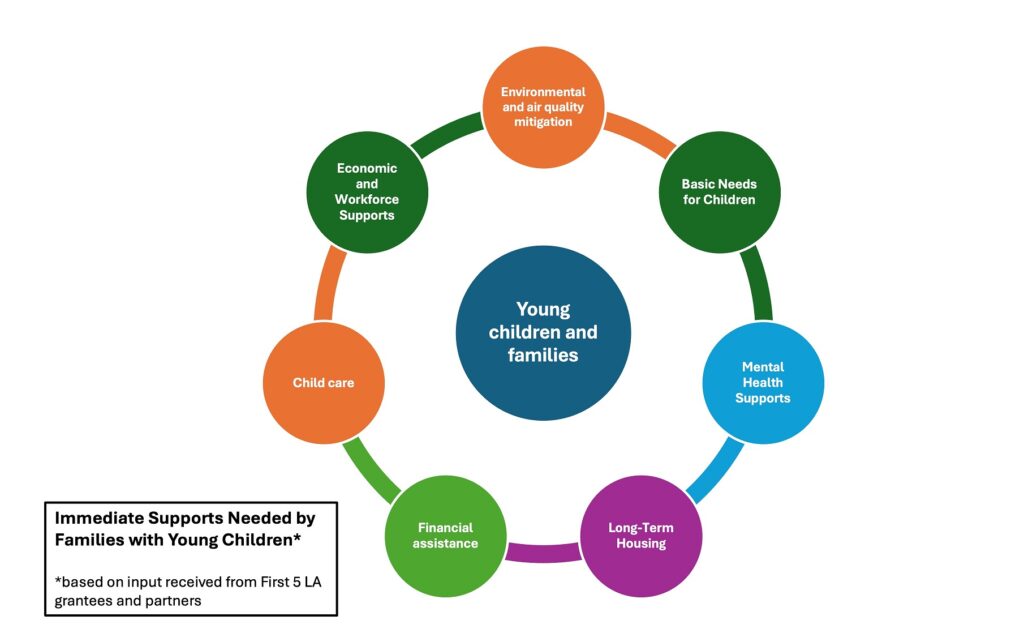
Child care quickly became a significant concern as reports began to emerge about the growing number of providers affected by the fires. As of mid-February, 42 licensed facilities were destroyed, and another nine were damaged, resulting in the loss of 2,792 spaces. In addition, a total of 30 subsidized Family, Friend and Neighbor caregivers were affected by the fires.
To address the needs of these children, First 5 LA began working with the Office for the Advancement of Early Care and Education (OAECE) and the Child Care Alliance of Los Angeles to revive the L.A. County Early Care & Education Response Team. Created in 2020 during the COVID-19 pandemic, the Response Team offers an existing infrastructure and system of partnerships that could be leveraged to respond to the current ECE crisis created by the fires, explains First 5 LA Senior Program Officer Jaime Kalenik.
“We know from the Response Team’s work during the pandemic that people needed a reliable place to go to,” says Kalenik. “At these meetings, the child care providers know they can get accurate and useful information from people they knew and trusted.”
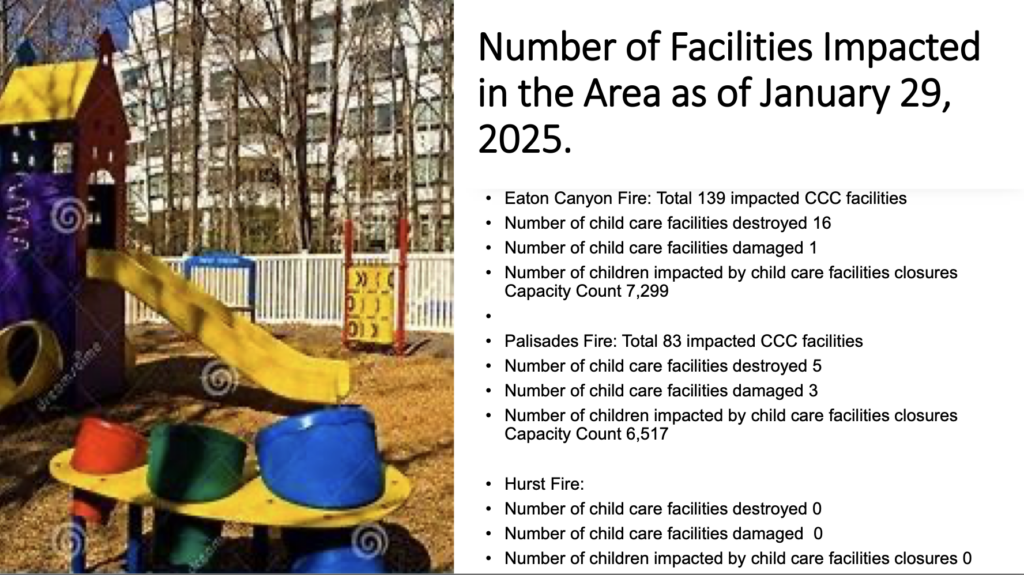
Slide from L.A. County Early Care & Education Response Team Webinar on January 30, 2025. Click here for the full Power Point deck.
First 5 LA serves as the backbone for the Response Team’s community meetings, offering both technology and communications tools that help ensure the most relevant information is being shared. While recent webinars have focused on response and recovery activities for ECE providers, the Response Team will shift toward long-term planning to ensure ongoing support for the ECE workforce, increased access for families, and optimal facility renovation and development in the areas impacted by the fires.
The Response Team’s focus on child care is crucial to L.A. County, Kalenik explains. Child care enables families, workplaces, and the economy to thrive while providing children with the support they need for their growth and learning. In order for parents to work and maintain economic stability for their families, child care is essential.
“Many of L.A.’s child care providers are home-based,” she adds. “They run day care out of their own home. So those child care providers who lost their homes in the fires also lost their place of business, their main source of income.”
According to a 2023 First 5 LA report, home-based child care is the primary type of non-parental care in Los Angeles County. In 2021, of the 61,105 children receiving subsidized voucher-based care in Los Angeles County, 77.4% were in home-based child care. Home-based care settings are also preferred by many families — especially families with infants and toddlers, low-income families working non-standard hours, those from immigrant backgrounds, families of color and families with children who have disabilities or special needs — over traditional child care centers.
At this time, the Response Team is working to get the word out among affected child care providers about several new policy changes that will help them get back on their feet. At the state level, Governor Gavin Newsom has issued a series of executive orders that suspended caps on administrative costs for state-funded preschool programs, extended deadlines for families to access child care, and cut red tape to streamline the rebuilding and recovery of homes in communities ravaged by the fires.
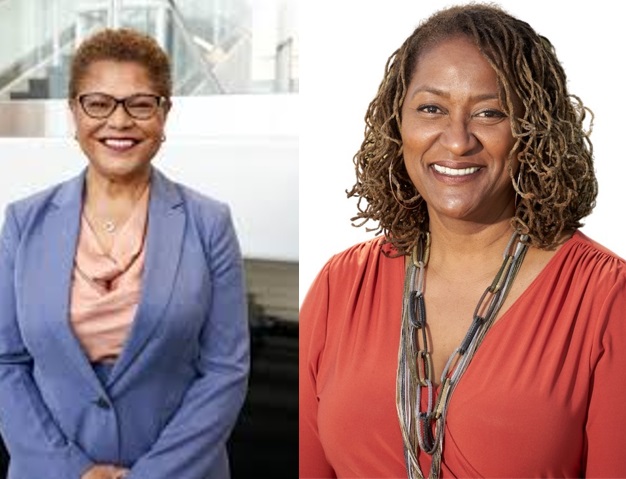 Newsom’s executive orders are further enhanced by actions at the local level. In early February, L.A. Mayor Karen Bass released an emergency executive order that reduces administrative barriers for child care providers seeking relocation and temporary operations. The order also addresses the immediate child-care needs of families by increasing the enrollment cap of schools and child care centers by 20%. On February 18, L.A. County Supervisor Holly Mitchell introduced a Board motion intended to address both immediate and long-term child care needs. The motion, which was unanimously approved by the Board, will connect child care providers to resources, streamline rebuilding processes, allow the temporary use of other facilities for child care programs, prioritize state budget proposals and legislation that support child care recovery and expedite emergency permits for childcare providers.
Newsom’s executive orders are further enhanced by actions at the local level. In early February, L.A. Mayor Karen Bass released an emergency executive order that reduces administrative barriers for child care providers seeking relocation and temporary operations. The order also addresses the immediate child-care needs of families by increasing the enrollment cap of schools and child care centers by 20%. On February 18, L.A. County Supervisor Holly Mitchell introduced a Board motion intended to address both immediate and long-term child care needs. The motion, which was unanimously approved by the Board, will connect child care providers to resources, streamline rebuilding processes, allow the temporary use of other facilities for child care programs, prioritize state budget proposals and legislation that support child care recovery and expedite emergency permits for childcare providers.
In the months to come, families with young children who were affected by the fires will need additional support in other areas as well. Housing will be an immediate priority for families whose homes were destroyed or damaged, as will access to basic necessities such as baby formula, diapers, clothing and food. Additional mental health resources will be needed as well for young children who will be at increased risk of Adverse Childhood Experiences following the fires. Already, the Response Team and other community partners have been focused on getting the word out to families about resources such as FEMA assistance, tenants’ rights, rebuilding resources, mental health supports, recovery grants, workers’ rights and more.
Throughout all this, First 5 LA is working in partnership to ensure that the needs of young children remain highlighted so that they and their families do not fall through the cracks. At the same time, First 5 LA is also committed to amplifying the voices and concerns of its community partners who work directly with families.
“As funding and other support starts coming in for fire recovery efforts,” says Kalenik, ” we need to advocate for some of that funding to go specifically for to both families with young children and the child care providers that take care of them.”
